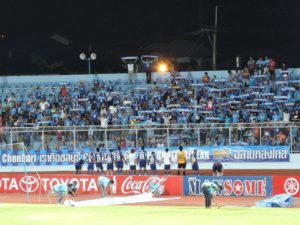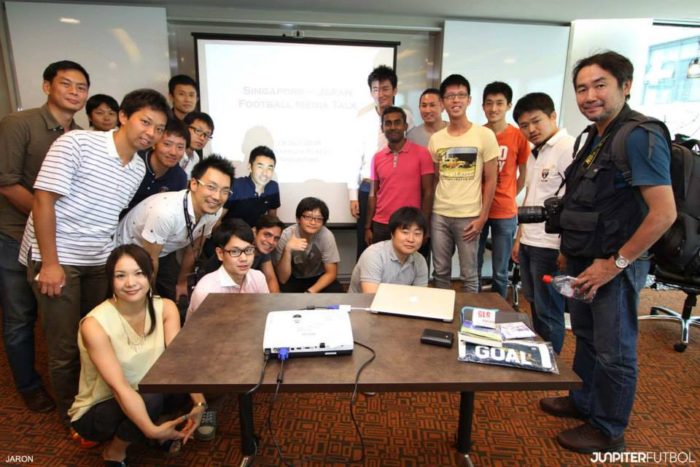- Column
2015/1/10 | Singapore
Football Media Talk – Singapore and Japan – 2nd Half
Following the football match between the Japan and Brazil, in October 2014, a media talk  was arranged between Japanese and Singaporean sports media persons by Institute for Future Asian Football.
was arranged between Japanese and Singaporean sports media persons by Institute for Future Asian Football.
The news reporters from many of the leading newspapers from both the countries gathered together to discuss the future of football in Asia, Japan and Singapore.
Japanese media, which seldom communicates with the media of the rest of the world, got an opportunity to speak to the Singapore media due to this media talk organised by the Asianfootball Institute (Institute for Future Asian Football). They exchanged information that led to a better understanding of the football in both the countries. They also discussed a planning process for the progress of football in Asia.
The media talk was mostly in English. Important parts of the discussion were translated into Japanese so as to increase the communication amongst all. Before the actual talk, a futsal game was organized which helped to break the language barrier.
<Agenda of the Media Talk >
・Current issues in Japanese football /Current issues in Singaporean football
・What Singapore wants to know about Japanese football
・What Japan wants to know about Singapore and Asian Football in general
2nd Half: Questions from Japan to Singapore
Q1: As compared to EPL or Bundesliga etc., how popular is J.League in Singapore?
- Due to the broadcast timings, Among the European leagues, EPL is most popular with the fans in Singapore. The broadcast time is from 10pm on Saturdays, so everyone can enjoy the matches.
- The matches of other leagues like Bundesliga and Liga Espanyol are broadcast very late, at 3 am in the night, and hence are less popular.
(S) The name of J.League itself is well known in Singapore but the players and teams in the league are not so popular. J.League matches are not broadcast on TV. So other than the internet websites, there is no other way to know more about J.League. The reason why they broadcast EPL on Saturdays is that there is the market. Not only the live broadcast but also news programs pick up EPL matches rather than those of Liga Espanola, Bundesliga and UEFA Champions League. Simply saying, the information about J.League in Singapore is extremely less. Only sometimes, live matches are broadcasted…
(S) When I was young, I saw Kazu (Miura Kazuyoshi) playing and developed interest in Japanese football. Do you remember Umbro Cup in England in 1995? At that time, the only way to know Japan Football from Singapore was to watch the program called “Japan Hour” on TV, which was only 1 minute a week, as highlights of the game. Nowa days you can find out any information through facebook, youtube etc. It seems that it’s possible to introduce the information of J.League to compete with European leagues. The image of J.League is of a very clean and professional league. It is respectable with high level of football, pitch condition, stadium infrastructure and merchandising.
(J) Your case might not be so common. What do the normal fans think about J.League?
(S) J.League is not so popular among the Singaporeans. One of the major issues is the lack of information due to the language barrier. I’m a fan of Shimizu S-Pulse but there is no way to get about it in depth information about it because there is not enough information on J.League club’s website and I cannot understand what they are commenting on the footage. If J.League is considering SEA as a market, I think overcoming the language barrier must be the topmost priority. I had gone to the practice match to get an article but neither of the players nor the Japanese staff could speak English and hence I could not get any response. When I asked some questions, Kawashira Eiji and Hafffner Mike were the only ones who answered.
(S) Can we watch all the goal scenes and past footages of J.League matches online?
(J) Not all the goals so far. But we will be able to see it on Yahoo! Japan in near future.
Q2: How can J.League show its presence in Singapore and SEA?
(J) It is the language , isn’t it?
(S) Exactly.
(S) English is known internationally.
(J) As one example, Cerezo Osaka that got Diego Forlan is trying to do promotion in 4 languages on Facebook and Twitter.
(S) This kind of initiative very good for SEA countries that send the players to J.League. Irfan is going from Indonesia to Japan, isn’t it?
(J) Last year, Le Cong Vin (Vietnam national team player) was also in Consadole Sapporo.
(S) J Clubs getting players from SEA will make J.League popular in SEA.
(J) We can say that it is similar to Japanese football fans watching Serie-A because Kazu and Nakata went to Italy.
(S) So, the answer to the question should be that Singaporean player can play in J.League (laugh)
(J) We must not to forget that Kenwood was the sponsor of Kazu at the time when he was transferred to Serie-A before Nakata’s case. Japan side needs more cash income from sponsors for accepting SEA players. If we consider from opposite point of view, is it worthwhile for the SEA companies to invest in J.League?
(S) There was a case in the past when a Singaporean woman player has joined the tryout of Women’s team in Japan. If our players can play in Japan, our companies will definitely get interested in J.League more and the investment decisions will be different as compared to the present situation.
(J) In recent years, China has got richer than when J.League started. However, there are no Chinese players in J1 League. Similarly there are no Indian players either. What do you think would be the occupancy rate of SEA players in the foreign players quota when J.League does not operate depending on the economic environment changes?
(S)Still it is the English problem. There are very few people who can communicate in English in Japanese football society.
(S) It so hard to communicate without translators. Even if we have a translator, according to our experience of visit to the Albirex Niigata facility in Japan, the quality and quantity of the information via a translator was not sufficient.
(J) It means that English is a must for coaches and marketing staff as well as players. This low level of English literacy is not only in the football community. The whole of Japan is facing a similar situation. I don’t know how can we improve this.
(S) Some of Korean professional golfers are playing at the international top level. They all can speak English, and that is helping them. It is important to adapt yourself to the market. Some Russian Tennis players are also going to higher positions in the market because they can speak English.
(S) It is very important to make conscious efforts to overcome the language barrier. By doing so each player can expand his own market, build a good relationship with media that can help him build a reputation and which will finally lead to a good play as well.. For example, EPL players who transfer to Liga Espanora learn Spanish language.
(S) Does JFA or the national team management ask the players to acquire English skills? The national team has many opportunities to play internationally….
(J) English lessons are being conducted at some of the youth teams or junior youth teams, but it is still not so popular with all clubs. I heard that Urawa Reds is doing it but looking at the players, I feel that they have still not understood its
(S) We can understand it very difficult for Japanese to get English language skills because Japanese and English are totally different languages. So, it is better to take English training at a younger age.
(J) Actually we do have English class at school. From junior high school, we take 1-hour English class everyday. We all learn, “this is a pen” (laugh). However, the fact that we cannot speak means that it is not working…
(S) I heard there are 4 official languages in Singapore. How many languages can you speak?
(S) Most of the Singaporeans can speak 2 or 3 languages including dialects.
(S) English and Mandarin is the most popular. The next is English – Malay and the trio of English-Mandarin-Malay etc…
(S) We don’t think we need to speak all the languages perfectly; as long as we can just communicate with each other.
(J) Any other answers for the question other than the language problem?
(S) I think it is good idea if J.League club has a match in SEA. The opponent can be…. how about Singapore team? (Juventus had a friendly match against selected team from Singapore League before the match of Brazil – Japan)
(J) How about that Albirex Niigata team from Japan? It also has a team in S-League.
(J) Albirex Niigata doesn’t have any star players like national team players? Is that ok?
(S) Albirex Niigata Singapore is a quite good team. They have many young players and are playing with good style, and also show good results.
(S) We can imagine how well J.League club organize their own operations because we regularly see Albirex Niigata Singapore.
(S) I suppose you can understand the presence and positioning of Albirex in Singapore by seeing the reaction of our Singaporean side. Additionally if the problem of English language is overcome the possibilities will definitely increase.
Q3: Which country in SEA is the most growing market for football in the near future?
(S) I think it would be Thailand. The level of football is better and developed as compared to Singapore. With more investments coming, good coaches are also coming and the stadiums are much more improved.
(J) Now many Japanese players including former national players are also selecting Thailand to play in this season.
(S) Cambodia and Myanmar may also develop in near future due to the increasing investments in football in these countries.
(S) Every ASEAN country has a different situation. In Thailand, the professional league is doing well and their players have mastered good techniques. Myanmar,is making efforts to strengthen its national team.. But alongwith this, there is the strong Mafia in Thailand, there are corruption problems in Vietnam, budget reduction issue in Myanmar, problem of Indonesian League splitting into 3 etc. There are both positive as well as negative situations at the same time.
(S) Singapore clubs and national team were very stronger than those of other SEA countries 1o years ago. But now, other countries also have improved their level in a short period.
(J) What is the current situation of ASEAN Super League plan?
(S) It is said that ASEAN Super League will start next year. The league contains a couple of popular teams in each SEA country. It’s different from AFC Champions League and the format will be such that the teams will be independent from their domestic leagues. At present the FIFA is conducting the check. It’s not just enough to to improve the level of football by making the domestic leagues but if all teams collaborate in this ASL scheme it can act as a great stimulus for the fans and sponsors.The domestic leagues will continue to function as before.
Q4: What is the situation of the football media (magazine, newspaper, TV, etc) in Singapore?
(S) There are some EPL magazines. But none for the local league.
(S) In Singapore, Internet is widely popular, so most of the people get sports news from Internet rather than paper media.
Q5: Regarding sports betting.
(J) Does sports betting have a positive effect on Media (news, newspaper, magazine etc)?
(S) Sports betting exists and has a huge impact. It makes money. The largest sports betting company called Singapore Pools is one of the main sponsorsof S-League.
(J) Do you have a culture without Sports betting?
(S) Betting is very common in Singapore. Most of the sports are object for the betting, not only football. Betting also takes place at each game of S League every week.
(S) It can be said that this betting culture is originated from China.
(S) There are some slot machines in the football stadiums. The profit from these slots machines forms a major part of revenue. Some teams rely on this revenue this has a big impact on the club management.
[Summary]
“If J.League considers South East Asia as their market, they have to adapt accordingly. The key factor is language. Using English to promote their information, J.League which already has created a very good impression in SEA can reach greater heights.
We suppose that this is the first time for both Japan and Singapore media to talk in this kind of talk session about future Asian football collaborating with each other. where they could say anything without formal translators, not relying on just language.
We can say with confidence that the future Asian Football that we are aiming at can be developed by the mutual understanding through media talks like this one,. We are looking out to find more opportunities to conduct such talk sessions not only within media persons, or only in Singapore but all over SEA.
(Institute for Future Asian Football / Hasegawa, Yomo)
- Hot News
- Hot Column
 World’s first? Player-Cum-Team Owner, Akihiro Kato Ventures in Cambodia
World’s first? Player-Cum-Team Owner, Akihiro Kato Ventures in Cambodia  J.League To Win Over Southeast Asian Fans
J.League To Win Over Southeast Asian Fans  Football Media Talk – Singapore & Japan – 1st Half
Football Media Talk – Singapore & Japan – 1st Half  Japan’s opponent: The best amateur football club in the world
Japan’s opponent: The best amateur football club in the world  Report of the Singapore -Japan Media Talk 2015/ What are the Ways to Engage with South East Asian Star Players
Report of the Singapore -Japan Media Talk 2015/ What are the Ways to Engage with South East Asian Star Players







